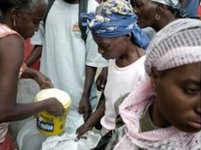 The UN has begun a large-scale aid distribution in Haiti's capital, aiming to feed two million people nearly three weeks after the deadly earthquake.
The UN has begun a large-scale aid distribution in Haiti's capital, aiming to feed two million people nearly three weeks after the deadly earthquake.
Only women will be able to collect the aid from 16 centres, exchanging vouchers for sacks of rice to give to their children and families.
The aid effort comes as 10 Americans were detained by Haitian authorities.
They are suspected of trying to take more than 30 children out the country without proper authorisation.
Haitian Social Affairs Minister Yves Christallin said police had arrested five men and five women travelling with 33 children on the border with the Dominican Republic.
'Misunderstanding'
"This is an abduction, not an adoption," Mr Christallin said, according to Agence France Presse.
Haitian authorities said that none of the children, some as young as two months, had documentation or proof that they were actually orphans.
But the Americans, from Idaho-based charity New Life Children's Refuge, they wanted to take quake victims to an orphanage in the Dominican Republic.
The group's head, Laura Silsby, said the arrests were the result of a mistake.
"Our understanding was that, we were told by a number of people including Dominican authorities that we would be able to bring the children across," she said.
"The mistake we made is that we didn't understand there was additional paperwork required."
But the BBC's Rupert Wingfield-Hayes, in Port-au-Prince, says that the regulations are very clear - each case of child adoption must be approved by the government.
Our correspondent says that even before the earthquake, child-smuggling was a massive problem in Haiti, with thousands of children disappearing each year.
Women only
In the capital Port au Prince, the UN's World Food Programme (WFP) has begun feeding families - distributing food only to women - at a series of 16 sites across the capital.
Each woman will receive a 25kg (55lb) bag of rice, enough to feed her family for two weeks.
Only women will be allowed to collect earthquake relief supplies, because - the WFP says - this has proved that is the best way to get food to the people who need it.
The WFP will work with the local authorities to ensure that men in need of assistance are not excluded, it said.
"Up until now the nature of this emergency has forced us to work in a 'quick and dirty' way simply to get food out," said Executive Director Josette Sheeran.
"This new system will allow us to provide food assistance to more people, more quickly through a robust network of fixed distribution sites."
The WFP says it has reached 600,000 people with over 16 million meals since the earthquake, amid huge logistical problems caused by damage to local infrastructure.
'Kids will die'
Separately, doctors working to treat survivors voiced concern that the US had halted the evacuation of the critically injured to the country.
A senior US medic told the BBC that scores of people injured in the earthquake could die if the US did not resume emergency evacuations soon.
"The consequences - in the kids with crushed chests and on ventilators and respirators, and some of the adults - are they will die," Barth Green, a senior American doctor at a field hospital in Port-au-Prince airport, told the BBC.
The US military stopped the flights to Florida on Wednesday.
A White House spokesman told the BBC the move was due to "logistical issues", not because of a row over medical costs as had been reported earlier.
Hundreds of patients with spinal injuries, burns and other wounds have been evacuated to the US since the 12 January quake that killed up to 200,000 people.



